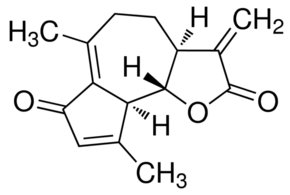All AbMole products are for research use only, cannot be used for human consumption.

Dehydroleucodine is a sesquiterpene lactone isolated from Artemisia douglasiana Besser; mast cell stabilizers. An extract from the plant is widely used in Cuyo region (Argentina) as folk medicine for the treatment of gastric ailments. The compound prevents gastric and duodenal damages in response to necrosis-inducing agents. Stabilization of mast cells may be a key mechanism to protect the gastrointestinal tract from injury and ulceration. Recently, it was established that dehydroleucodine and xanthatin inhibit mast cell degranulation induced by compound 48/80.

Front Pharmacol. 2025 Apr 14;16:1572364.
Dehydroleucodine exerts an antiproliferative effect on human Burkitt’s lymphoma Daudi cells via SLC7A11-mediated ferroptosis
Dehydroleucodine purchased from AbMole
| Molecular Weight | 244.29 |
| Formula | C15H16O3 |
| CAS Number | 36150-07-9 |
| Solubility (25°C) | DMSO: ≥30 mg/mL |
| Storage |
Powder -20°C 3 years ; 4°C 2 years In solvent -80°C 6 months ; -20°C 1 month |
| Related Apoptosis Products |
|---|
| Coenzyme Q0
Coenzyme Q0 (CoQ0) is a potent, oral active ubiquinone compound. Coenzyme Q0 induces apoptosis and autophagy, suppresses of HER-2/AKT/mTOR signaling to potentiate the apoptosis and autophagy mechanisms. Coenzyme Q0 regulates NFκB/AP-1 activation and enhances Nrf2 stabilization in attenuation of inflammation and redox imbalance. |
| C6 Ceramide
C6 Ceramide (C6-Cer) is a short-chain, cell-permeable ceramide pathway activator with anticancer activity. C6 Ceramide-mediated miR-29b expression participates in the progression of multiple myeloma through suppressing the proliferation, migration and angiogenesis of endothelial cells by targeting Akt signal pathway. |
| DB2115 tertahydrochloride
DB2115 tertahydrochloride is a potent inhibitor of myeloid master regulator PU.1. DB2115 tertahydrochloride has the potential for researching cancers, including hematologic cancers. |
| 14-3-3η Protein inhibitor 1
14-3-3η Protein inhibitor 1 is a 14-3-3η protein inhibitor with a KD of 35 µM. |
| Deferoxamine
Deferoxamine (Deferoxamine B) is an iron chelator (binds to Fe(III) and many other metal cations), is widely used to reduce iron accumulation and deposition in tissues. Deferoxamine upregulates HIF-1α levels with good antioxidant activity. Deferoxamine also shows anti-proliferative activity, can induce apoptosis and autophagy in cancer cells. |
All AbMole products are for research use only, cannot be used for human consumption or veterinary use. We do not provide products or services to individuals. Please comply with the intended use and do not use AbMole products for any other purpose.


Products are for research use only. Not for human use. We do not sell to patients.
© Copyright 2010-2024 AbMole BioScience. All Rights Reserved.
